【英语教案】Unit13Wearetryingtosavetheearth!教案
教案Unit 13 We are trying to save the earth!

Unit 13 We are trying to save the earth!第一课时Section A(1a ~ 2d)I. 知识目标重点单词1. litter v.乱扔;n. 垃圾;2. ugly adj. 丑陋的;3. advantage n. 优点;4. cost v. 花费;5. wooden adj. 木制的;6. bottom n. 底部;7. fisherman n. 渔民;8. coal n. 煤;9. plastic adj. 塑料的; 10. takeaway n. 外卖食物;11. bin n. 垃圾箱重点词组1. at the bottom of the river在河床底部2. be full of the rubbish充满了垃圾3. throw litter into the river把垃圾扔入河中4. land pollution土地污染5. play a part in cleaning it up尽一份力把它清理干净6. make a difference产生影响7. fill the air with black smoke使空气中充满了黑烟8. cut down air pollution减少空气污染重点句式1. Everyone in town should play a part in cleaning it up. 城里的每个人都应当尽一份力把它清理干净。
2. To cut down air pollution, we should take the bus or subway instead of driving.为了减少空气污染,我们应当乘坐公汽或地铁而不是开车。
II. 课堂环节§自主学习方案【自学自查】根据汉语提示完成单词。
1. We should put up notice to stop from littering (乱扔)。
人教版英语九年级全册Unit13Wearetryingtosavetheearth课优秀教学案例
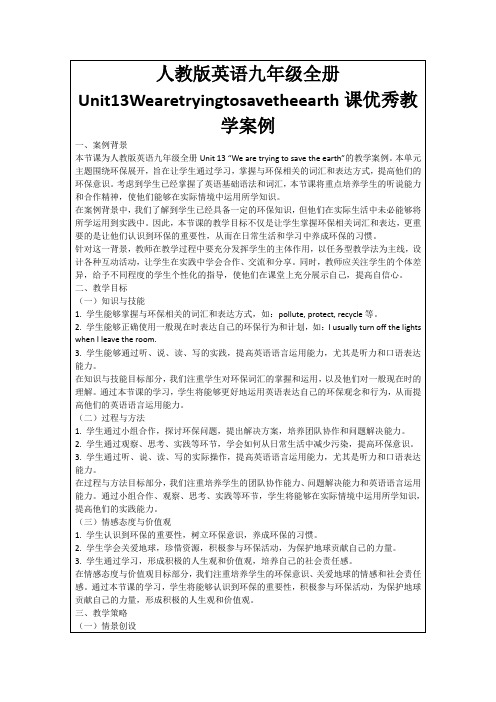
3.小组合作:教师将学生分成小组,让他们在小组内进行讨论、合作和实践。这种小组合作的形式,不仅培养了学生的团队协作能力和沟通能力,而且还提高了他们的实践能力,使他们在合作中发现问题、解决问题,提高了学习的实效性。
二、教学目标
(一)知识与技能
1.学生能够掌握与环保相关的词汇和表达方式,如:pollute, protect, recycle等。
2.学生能够正确使用一般现在时表达自己的环保行为和计划,如:I usually turn off the lights when I leave the room.
3.学生能够通过听、说、读、写的实践,提高英语语言运用能力,尤其是听力和口语表达能力。
2.教师设计各种小组活动,如共同完成任务、一起解决问题等,让学生在实践中学会合作、交流和分享,提高他们的实践能力。
3.教师对小组合作的过程进行观察和评价,及时给予反馈和建议,帮助学生不断提高团队合作的效果。
在小组合作部分,我们注重培养学生的团队协作能力、沟通能力和实践能力。通过设计各种小组活动,让学生在实践中学会合作、交流和分享,提高他们的实践能力。同时,教师对小组合作的过程进行观察和评价,及时给予反馈和建议,帮助学生不断提高团队合作的效果。
人教版英语九年级全册Unit13Wearetryingtosavetheearth课优秀教学案例
一、案例背景
本节课为人教版英语九年级全册Unit 13 “We are trying to save the earth”的教学案例。本单元主题围绕环保展开,旨在让学生通过学习,掌握与环保相关的词汇和表达方式,提高他们的环保意识。考虑到学生已经掌握了英语基础语法和词汇,本节课将重点培养学生的听说能力和合作精神,使他们能够在实际情境中运用所学知识。
Unit13 We re trying to save the earth! SectionA教案

Unit 13 We’re trying to save the earth! (Period 1)Section A (1a-2d)教材分析本单元话题是“保护环境”(Protecting the environment)。
本节课是本单元的第一节课,是一节听说课,主要通过图文匹配、听说训练,让学生在听说的过程中掌握谈论各种污染类型及解决空气污染和垃圾污染的方法的表达,培养学生保护环境的意识。
教学目标学完这一课,学生能够掌握:1.词汇:litter、bottom、fisherman、coal、ugly、advantage、cost、wooden、plastic、takeaway、bin;2.能力:综合运用看、听、说和讨论等手段获取信息;3.交际功能:熟练运用现在进行时、used to、被动语态、现在完成时、情态动词等恰当的语法结构谈论环境污染和环境保护问题。
教学重点1.重点词汇:bottom、play a part in、instead of、advantage、cost、wooden、takeaway、make a difference、lead to。
2.重点句型:谈论环境污染和环境保护问题的句型:We’re trying to save the earth!It used to be so clean!The air is badly polluted.To cut down air pollution, we should take the bus or subway instead of driving.Our actions can make a difference and lead to a better future!教学难点结合生活实际谈论环境污染和环境保护问题。
教学过程新课导入教师呈现一些环境优美的居住地或宜居城市的环境图片,向学生介绍这些地方的情况。
然后再呈现一些环境污染严重的城市的图片,让学生说说我们在生活中面临什么样的环境问题,产生这些问题的原因是什么,从而引出环境污染的话题。
人教新目标九年级英语全册Unit13Wearetryingtosavetheearth

6.教学评价:采用多元化评价方式,关注学生在知识、技能、情感等方面的全面发展。同时,鼓励学生自我评价和互相评价,提高他们的批判性思维和反思能力。
7.教学策略:
(1)采用任务型教学法,让学生在完成具体任务的过程中,学习语言知识,提高语言运用能力。
(二)过程与方法
1.通过小组合作和讨论,培养学生们的合作意识和团队精神,提高学生的英语口头表达能力。
2.通过阅读文章,培养学生的阅读技巧,如快速阅读、找关键词、理解文章大意等。
3.通过课后实践活动,培养学生们的环保意识,提高他们运用英语解决实际问题的能力。
4.利用多媒体和互联网资源,激发学生的学习兴趣,拓宽他们的知识视野。
(二)教学设想
1.创设情境:以环保为主题,通过展示地球环境现状的图片和视频,激发学生的环保意识,为新课的学习做好情感铺垫。
2.导入新课:通过提问方式引导学生复习现在进行时态,为新课的学习打下基础。同时,引入被动语态的概念,让学生初步感知被动语态的用法。
3.课文学习:
(1)让学生自主阅读课文,找出与环保相关的词汇和表达方式,培养他们的自主学习能力。
(2)运用情境教学法,创设生动有趣的情境,激发学生的学习兴趣,提高他们的学习积极性。
(3)注重分层教学,针对学生的个体差异,给予不同难度的任务,使每个学生都能在课堂上获得成就感。
四、教学内容与过程
(一)导入新课
1.教师通过多媒体展示地球环境现状的图片和视频,引导学生关注环保问题,激发他们的学习兴趣和环保意识。
2.各小组讨论以下问题:(1)What is the problem we are facing?(我们面临的问题是什么?);(2)Why is it important to solve this problem?(为什么解决这个问题很重要?);(3)What are we doing to solve this problem?(我们正在做什么来解决这个问题?)。
人教版九年级英语Unit 13 We’re trying to save the earth 教案
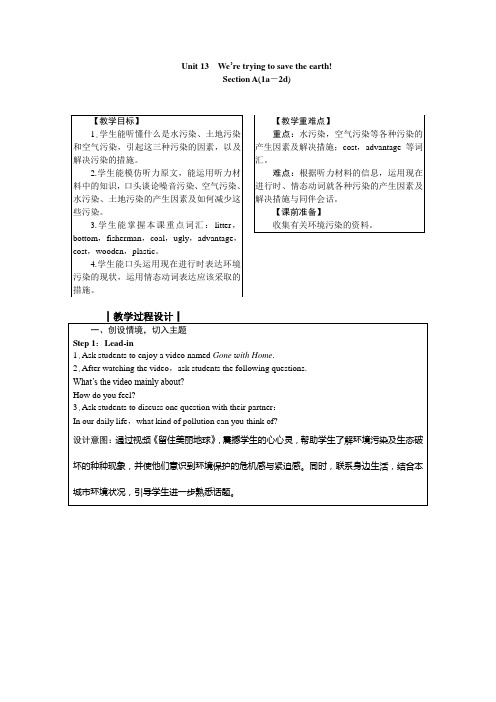
Unit 13We’re trying to save the earth!Section A(1a-2d)┃教学小结┃【板书设计】Unit 13We’re trying to save the earth!Section A(Section A(3a-4c)┃教学小结┃Section B(1a-1e)┃教学小结┃Section B(2a-2e)设计意图:读前预测,为学生在接下来的阅读中获取文章大意作准备。
思维导图可以帮助学生理清文章脉络。
Step 5:Use pictures to teach the new words.When students think about the questions in Step 3,the teacher can write down the new words on the blackboard.And teach them the new words.设计意图:适时呈现词汇,可以减轻学生的阅读压力。
While readingStep 6:Fast reading1.Ask students to look through the article quickly and find out the answer to each question.How many people are mentioned in the passage?Who are they?2.The teacher adds information to the mind-map.设计意图:扫读整篇文章,获取大意,帮助学生把握文章的整体性。
Step 7:Careful reading(Paragraph 2)1.Ask students to read Paragraph 2 carefully and fill in the chart.2.Check answers.3.The teacher adds the information to the mind-map.Step 8:Careful reading(Paragraph 3)1.Ask students to read Paragraph 3 carefully and fill in the chart.2.Check answers.Name What did she make?What materials did she use?Jessica Wong bags old clothes,especially old jeans3.The teacher adds the information to the mind-map.Step 9:Careful reading(Paragraph 4)1.Ask students to read Paragraph 4 carefully and fill in the chart.2.Check answers.Name What did he make?What materials did he use?Wang Tao beautiful art pieces iron and other materials from old cars3.The teacher adds the information to the mind-map.Which things can be done by common people every day?Which things have to be done by governments and organizations?Common people Governments Organizations2.Ask several groups to give a report.设计意图:教师让学生对所学的保护环境的措施进行归纳和分类,培养学生分析问题和解决问题的能力。
Unit13 We are trying to save the earth!Section教学设计
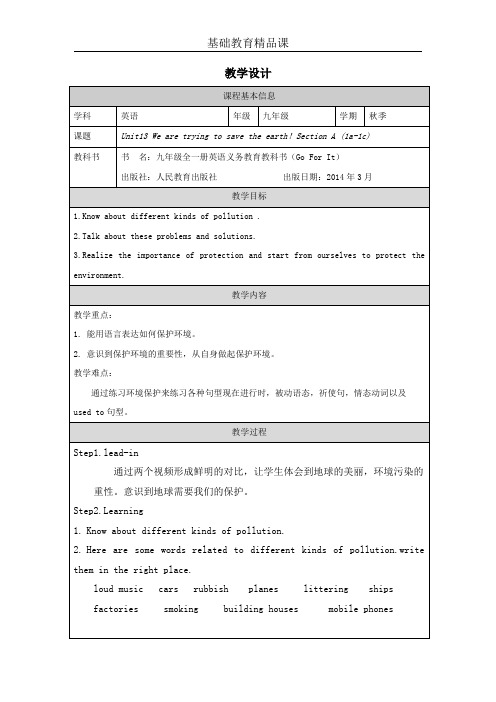
noise pollution
air pollution
water pollution
3.Talk about what we should do to save the earth?
Turn off the light when you leave a room.
Tony: Everyone should play a part in cleaning it up!
Show some samples
Conversation 1.Bob: How terrible!
Lily: There is plastic everywhere.
Bob: But it used to very beautiful.
To cut down air pollution,we should take the bus or subway instead of driving.
put waste into the river.
We should reduce the use of plastic bags.
Recycle books and paper.
2.Talk about these problems and solutions.
3.Realize the importance of protection and start from ourselves to protect the environment.
教学内容
教学重点:
1.能用语言表达如何保护环境。
6.In the end listen a song
《八年级英语 We're trying to save the earth!》教学设计

《八年级英语Unit13We're trying to save the earth!》教学设计
一、教学目标
1.掌握与环保相关的词汇和表达。
2.了解环保的重要性,培养学生的环保意识。
3.能够用英语表达自己对环保的看法和建议。
二、教学重难点
1.重点:环保词汇和表达,以及用英语讨论环保问题。
2.难点:引导学生深入思考环保问题并提出切实可行的建议。
三、教学方法
情景教学法、讨论法、多媒体教学法。
四、教学过程
1.导入
播放一段关于环境污染的视频,引出环保话题。
2.词汇学习
教授环保相关的词汇,如:pollution,recycle,conservation等。
3.阅读教学
(1)阅读一篇关于环保的文章,理解文章主旨。
(2)提出问题,引导学生思考环保问题。
4.小组讨论
(1)讨论身边的环境问题和解决方法。
(2)分享自己的环保行动。
5.口语表达
学生进行环保主题的演讲。
6.写作训练
写一篇关于环保的倡议书。
7.总结归纳
总结环保的重要性和行动建议。
8.作业布置
(1)完成课后练习。
(2)制定自己的环保计划,并在一周内实施。
人教版英语九年级全册Unit13Wearetryingtosavetheearth课教学设计
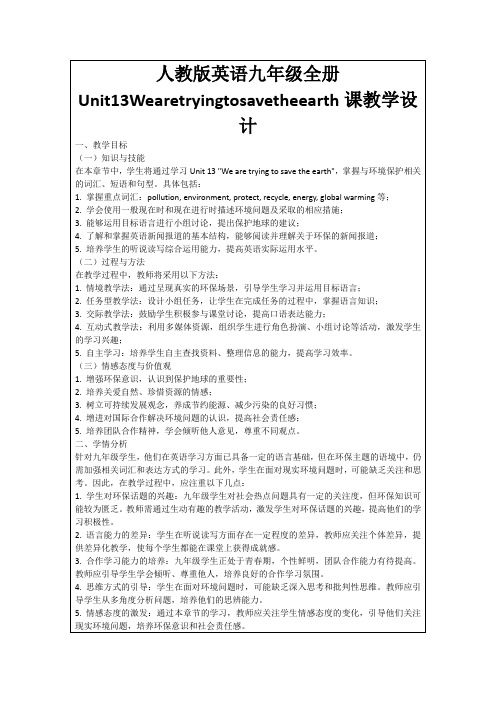
-通过问答、角色扮演等互动方式,巩固所学知识。
(三)学生小组讨论
1.教学活动设计:
-将学生分成小组,针对某一环境问题进行讨论,如空气污染、水污染等;
-小组成员分别扮演不同角色,如环保专家、政府官员、市民等,提出解决问题的建议;
-各小组汇报讨论成果,其他小组进行评价和补充。
-采用个别辅导和小组合作相结合的方式,关注学生的个体差异;
-及时反馈学生的练习情况,针对性地进行指导;
-鼓励学生积极参与,提高课堂练习的效果。
(五)总结归纳
1.教学活动设计:
-教师与学生一起回顾本节课所学的主要知识点;
-学生分享自己的学习心得和感悟;
-教师强调环保意识的重要性,并提出课后实践任务。
2.教学目标:
1.增强环保意识,认识到保护地球的重要性;
2.培养关爱自然、珍惜资源的情感;
3.树立可持续发展观念,养成节约能源、减少污染的良好习惯;
4.增进对国际合作解决环境问题的认识,提高社会责任感;
5.培养团队合作精神,学会倾听他人意见,尊重不同观点。
二、学情分析
针对九年级学生,他们在英语学习方面已具备一定的语言基础,但在环保主题的语境中,仍需加强相关词汇和表达方式的学习。此外,学生在面对现实环境问题时,可能缺乏关注和思考。因此,在教学过程中,应注重以下几点:
2.任务型教学法:设计小组任务,让学生在完成任务的过程中,掌握语言知识;
3.交际教学法:鼓励学生积极参与课堂讨论,提高口语表达能力;
4.互动式教学法:利用多媒体资源,组织学生进行角色扮演、小组讨论等活动,激发学生的学习兴趣;
5.自主学习:培养学生自主查找资料、整理信息的能力,提高学习效率。
《Unit 13 We are trying to save the earth!》教案

Unit 13 Were trying to save the earth!Period 3一、教学目标:Language aims:1.Key words:shark,fin,cruel,harmful,chain,ecosystem,industry,law,scientific2.Key phases:be harmful to,at the top of,the food chain,so far, not only… but also…3.Sentence pattern:Many have heard of shark fin soupThis is not only cruel, but also harmful to the environment.The numbers of some kinds of sharks have fallen by over 90 percent in the last 20 to 30 yearsEmotion aim: learn how to protect animals in danger二、学情分析本课内容是关于充满神秘感的海洋生物——鲨鱼的,所以学生很感兴趣。
三、重点短语及句型短语:be harmful to,at the top of,the food chain,so far, not only… but also…句型:Many have heard of shark fin soupThis is not only cruel, but also harmful to the environment.The numbers of some kinds of sharks have fallen by over 90 percent in the last 20 to 30 years教学过程:Step1Lead inTeacher: There are many kinds of pollution in our daily life. They are not only seen on the land, but also in the ocean. In the deep sea, there’re many kinds of creatures, but some of them are in danger.意图:把话题引入神秘的海洋,过渡自然,引起学生的兴趣。
Unit 13 We’re trying to save the earth(第2课时)教学设计
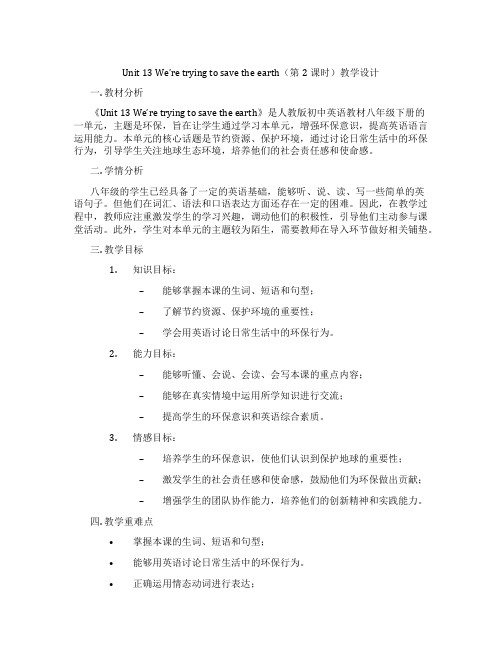
Unit 13 We’re trying to save the earth(第2课时)教学设计一. 教材分析《Unit 13 We’re trying to save the earth》是人教版初中英语教材八年级下册的一单元,主题是环保,旨在让学生通过学习本单元,增强环保意识,提高英语语言运用能力。
本单元的核心话题是节约资源、保护环境,通过讨论日常生活中的环保行为,引导学生关注地球生态环境,培养他们的社会责任感和使命感。
二. 学情分析八年级的学生已经具备了一定的英语基础,能够听、说、读、写一些简单的英语句子。
但他们在词汇、语法和口语表达方面还存在一定的困难。
因此,在教学过程中,教师应注重激发学生的学习兴趣,调动他们的积极性,引导他们主动参与课堂活动。
此外,学生对本单元的主题较为陌生,需要教师在导入环节做好相关铺垫。
三. 教学目标1.知识目标:–能够掌握本课的生词、短语和句型;–了解节约资源、保护环境的重要性;–学会用英语讨论日常生活中的环保行为。
2.能力目标:–能够听懂、会说、会读、会写本课的重点内容;–能够在真实情境中运用所学知识进行交流;–提高学生的环保意识和英语综合素质。
3.情感目标:–培养学生的环保意识,使他们认识到保护地球的重要性;–激发学生的社会责任感和使命感,鼓励他们为环保做出贡献;–增强学生的团队协作能力,培养他们的创新精神和实践能力。
四. 教学重难点•掌握本课的生词、短语和句型;•能够用英语讨论日常生活中的环保行为。
•正确运用情态动词进行表达;•在真实情境中运用所学知识进行交流。
五. 教学方法1.任务型教学法:通过设定各种真实的任务,让学生在完成任务的过程中运用所学知识,提高英语实际运用能力。
2.情境教学法:创设各种真实的语境,让学生在特定的情境中学习英语,提高他们的学习兴趣和积极性。
3.合作学习法:学生进行小组讨论、合作完成任务,培养他们的团队协作能力和沟通能力。
4.启发式教学法:教师引导学生思考、探究问题,激发他们的学习兴趣和求知欲。
初中英语九年级Unit 13 We’re trying to save the earth教案
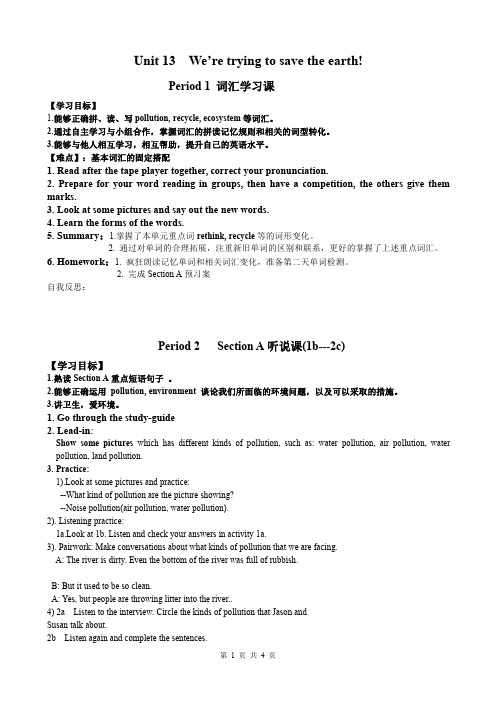
Unit13We’re trying to save the earth!Period1词汇学习课【学习目标】1.能够正确拼、读、写pollution,recycle,ecosystem等词汇。
2.通过自主学习与小组合作,掌握词汇的拼读记忆规则和相关的词型转化。
3.能够与他人相互学习,相互帮助,提升自己的英语水平。
【难点】:基本词汇的固定搭配1.Read after the tape player together,correct your pronunciation.2.Prepare for your word reading in groups,then have a competition,the others give them marks.3.Look at some pictures and say out the new words.4.Learn the forms of the words.5.Summary:1.掌握了本单元重点词rethink,recycle等的词形变化。
2.通过对单词的合理拓展,注重新旧单词的区别和联系,更好的掌握了上述重点词汇。
6.Homework:1.疯狂朗读记忆单词和相关词汇变化,准备第二天单词检测。
2.完成Section A预习案自我反思:Period2Section A听说课(1b---2c)【学习目标】1.熟读Section A重点短语句子。
2.能够正确运用pollution,environment谈论我们所面临的环境问题,以及可以采取的措施。
3.讲卫生,爱环境。
1.Go through the study-guide2.Lead-in:Show some pictures which has different kinds of pollution,such as:water pollution,air pollution,water pollution,land pollution.3.Practice:1).Look at some pictures and practice:--What kind of pollution are the picture showing?--Noise pollution(air pollution,water pollution).2).Listening practice:1a.Look at1b.Listen and check your answers in activity1a.3).Pairwork:Make conversations about what kinds of pollution that we are facing.A:The river is dirty.Even the bottom of the river was full of rubbish.B:But it used to be so clean.A:Yes,but people are throwing litter into the river..4)2a Listen to the interview.Circle the kinds of pollution that Jason andSusan talk about.2b Listen again and complete the sentences.5)2c PairworkJason:The air has become really polluted around here.I am getting very worried.Susan:Yes,I used to be able to see stars in the sky,but…4.Summary:通过对话和听力练习熟练掌握了be harmful to的用法,并对各种污染有所了解。
【英语教案】Unit13Wearetryingtosavetheearth!教案
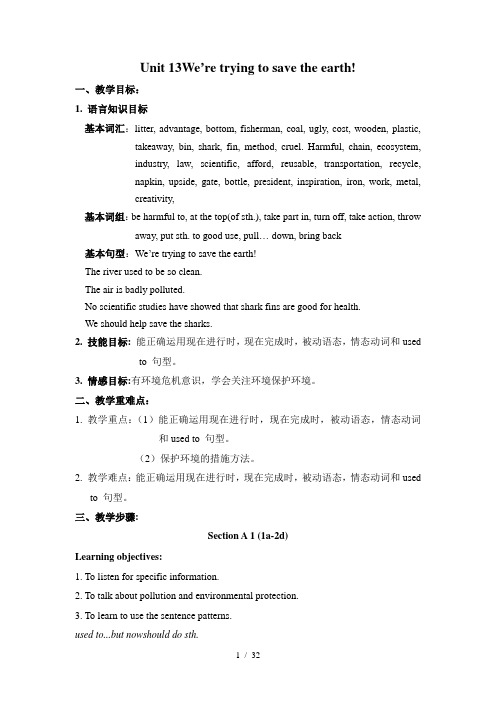
Unit 13We’re trying to save the earth!一、教学目标:1. 语言知识目标基本词汇:litter, advantage, bottom, fisherman, coal, ugly, cost, wooden, plastic, takeaway, bin, shark, fin, method, cruel. Harmful, chain, ecosystem,industry, law, scientific, afford, reusable, transportation, recycle,napkin, upside, gate, bottle, president, inspiration, iron, work, metal,creativity,基本词组:be harmful to, at the top(of sth.), take part in, turn off, take action, throw away, put sth. to good use, pull… down, bring back基本句型:We’re trying to save the earth!The river used to be so clean.The air is badly polluted.No scientific studies have showed that shark fins are good for health.We should help save the sharks.2. 技能目标: 能正确运用现在进行时,现在完成时,被动语态,情态动词和usedto 句型。
3. 情感目标:有环境危机意识,学会关注环境保护环境。
二、教学重难点:1. 教学重点:(1)能正确运用现在进行时,现在完成时,被动语态,情态动词和used to 句型。
(2)保护环境的措施方法。
人教版九年级英语全册Unit13Wearetryingtosavetheearth!优秀教学案例

1.在教学过程中,引导学生进行自我反思,检查自己的学习进度和成果。
2.通过互评、自评等方式,让学生了解自己行评价,关注学生的全面发展,给予及时的反馈和鼓励。
作为一名特级教师,我将充分发挥教学策略的作用,关注学生的个体差异,创设生动、有趣的教学情境,引导学生在实践中学习、在合作中成长。同时,我也将注重学生的反思与评价,帮助他们不断调整学习策略,提高自己的环保意识和英语能力。在这个过程中,我相信学生们能够收获更多的知识和成长。
2.通过问题链的形式,让学生在解决问题的过程中,逐步深入理解环保的重要性。
3.鼓励学生主动提出问题,培养他们独立思考和解决问题的能力。
(三)小组合作
1.将学生分成若干小组,鼓励他们相互合作、共同探究,提高团队合作精神。
2.设计具有挑战性和实践性的小组活动,如:环保主题活动、辩论赛等。
3.引导学生通过讨论、交流、分享等方式,共同完成任务,提高自己的环保意识和英语能力。
4.学生能够学会关爱自然,尊重生命,培养良好的道德品质和人文素养。
作为一名特级教师,我深知教学目标的重要性。在教学过程中,我将密切关注学生的学习进展,不断调整教学策略,确保每位学生都能达到本节课的教学目标。同时,我也将注重培养学生的自主学习能力和团队合作精神,使他们在学习过程中获得更多的收获和成长。
四、教学内容与过程
(一)导入新课
1.展示地球污染的图片、视频等资料,让学生直观地感受到环保的重要性。
2.向学生提出问题:“你们认为环保问题严重吗?为什么?”引导学生思考和讨论。
3.引入本节课的主题:“We are trying to save the earth!”,激发学生的学习兴趣。
(二)讲授新知
2.学生能够理解环保的重要性,并能够运用所学知识表达自己对环保的看法和建议。
人教版英语九年级Unit13《We’retryingtosavetheearth》全单元说课稿
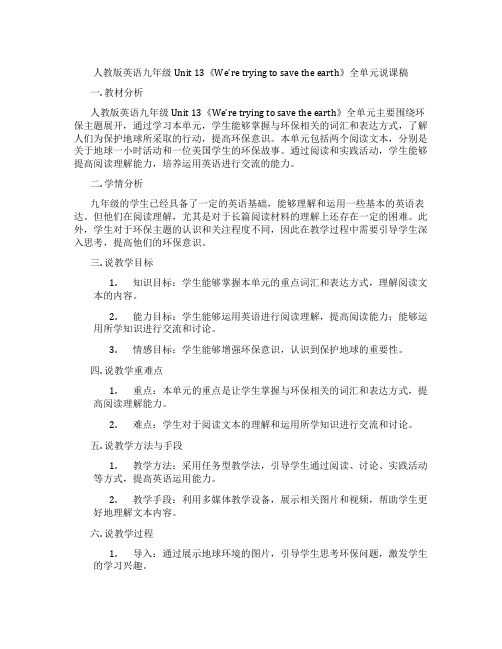
人教版英语九年级Unit 13《We’re trying to save the earth》全单元说课稿一. 教材分析人教版英语九年级Unit 13《We’re trying to save the earth》全单元主要围绕环保主题展开,通过学习本单元,学生能够掌握与环保相关的词汇和表达方式,了解人们为保护地球所采取的行动,提高环保意识。
本单元包括两个阅读文本,分别是关于地球一小时活动和一位美国学生的环保故事。
通过阅读和实践活动,学生能够提高阅读理解能力,培养运用英语进行交流的能力。
二. 学情分析九年级的学生已经具备了一定的英语基础,能够理解和运用一些基本的英语表达。
但他们在阅读理解,尤其是对于长篇阅读材料的理解上还存在一定的困难。
此外,学生对于环保主题的认识和关注程度不同,因此在教学过程中需要引导学生深入思考,提高他们的环保意识。
三. 说教学目标1.知识目标:学生能够掌握本单元的重点词汇和表达方式,理解阅读文本的内容。
2.能力目标:学生能够运用英语进行阅读理解,提高阅读能力;能够运用所学知识进行交流和讨论。
3.情感目标:学生能够增强环保意识,认识到保护地球的重要性。
四. 说教学重难点1.重点:本单元的重点是让学生掌握与环保相关的词汇和表达方式,提高阅读理解能力。
2.难点:学生对于阅读文本的理解和运用所学知识进行交流和讨论。
五. 说教学方法与手段1.教学方法:采用任务型教学法,引导学生通过阅读、讨论、实践活动等方式,提高英语运用能力。
2.教学手段:利用多媒体教学设备,展示相关图片和视频,帮助学生更好地理解文本内容。
六. 说教学过程1.导入:通过展示地球环境的图片,引导学生思考环保问题,激发学生的学习兴趣。
2.阅读理解:学生自主阅读文本,回答相关问题,教师进行讲解和指导。
3.小组讨论:学生分组讨论,分享各自的观点和感受,教师进行巡回指导。
4.实践活动:学生根据所学内容,进行角色扮演或写作练习,教师进行评价和指导。
unit13we are trying to优秀教案

unit13we are trying to优秀教案Unit 13 We Are Trying to Save the Earth教案一、教学目标1. 知识目标:学生能够掌握本单元的重点词汇和句型,理解课文内容。
2. 能力目标:学生能够运用所学知识,进行口头和书面表达,提高语言运用能力。
3. 情感目标:培养学生对地球环境保护的意识,认识到保护环境的重要性,养成爱护地球的良好习惯。
二、教学内容本单元主要围绕“环境保护”这一主题展开,涉及到的内容包括环保词汇、句型、阅读材料等。
通过本单元的学习,学生将了解地球面临的环保问题,掌握一些实用的环保方法,并能够运用所学知识进行实际操作。
三、教学重难点1. 教学重点:掌握本单元的重点词汇和句型,理解课文内容。
2. 教学难点:运用所学知识进行口头和书面表达,提高语言运用能力。
四、教具和多媒体资源1. 黑板:用于书写重点词汇和句型。
2. 投影仪:播放PPT课件,展示阅读材料和练习题。
3. 教学软件:提供在线学习资源和学习工具。
五、教学方法1. 激活学生的前知:通过提问、展示图片等方式,了解学生对地球环境和环保问题的认知情况。
2. 教学策略:采用讲解、示范、小组讨论、任务型教学等方法,帮助学生掌握知识、提高能力。
3. 学生活动:组织学生进行角色扮演、小组讨论等,增强学习的互动性和实践性。
六、教学过程1. 导入(5分钟)教师通过提问和展示图片的方式,引导学生谈论地球环境和环保问题,激发学生的兴趣和思考。
2. 讲授新课(30分钟)教师讲解本单元的重点词汇和句型,通过例句和实际情境帮助学生理解。
同时,通过PPT课件展示阅读材料和练习题,引导学生进行阅读和思考。
在讲解过程中,教师要注意引导学生发现语言规律,总结学习方法和技巧。
3. 巩固练习(20分钟)学生在小组内进行讨论,运用所学知识进行口头和书面表达。
教师可以组织学生进行角色扮演、模拟对话等活动,提高学生的语言运用能力。
Unit 13 We’re trying to save the earth(三)课堂教案
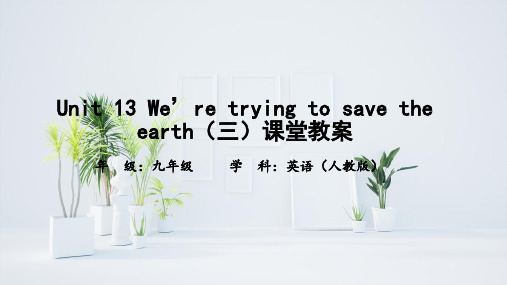
2. Do you think sharks are endangered? Why?
Yes. Because I know people may kill them for their fins and oil. Also, the title tells us to save them.
1st Reading
Environmental protection groups around the world, such as WildAid and the WWF, are teaching the public about “finning”. They have even asked governments to develop laws to stop the sale of shark fins. So far, no scientific studies have shown that shark fins are good for health, so why eat them? Help save the sharks!
Read and complete the mind map with proper words.
Save the sharks
about the shark fin soup
- 1、下载文档前请自行甄别文档内容的完整性,平台不提供额外的编辑、内容补充、找答案等附加服务。
- 2、"仅部分预览"的文档,不可在线预览部分如存在完整性等问题,可反馈申请退款(可完整预览的文档不适用该条件!)。
- 3、如文档侵犯您的权益,请联系客服反馈,我们会尽快为您处理(人工客服工作时间:9:00-18:30)。
Unit 13We’re trying to save the earth!一、教学目标:1. 语言知识目标基本词汇:litter, advantage, bottom, fisherman, coal, ugly, cost, wooden, plastic, takeaway, bin, shark, fin, method, cruel. Harmful, chain, ecosystem,industry, law, scientific, afford, reusable, transportation, recycle,napkin, upside, gate, bottle, president, inspiration, iron, work, metal,creativity,基本词组:be harmful to, at the top(of sth.), take part in, turn off, take action, throw away, put sth. to good use, pull… down, bring back基本句型:We’re trying to save the earth!The river used to be so clean.The air is badly polluted.No scientific studies have showed that shark fins are good for health.We should help save the sharks.2. 技能目标: 能正确运用现在进行时,现在完成时,被动语态,情态动词和usedto 句型。
3. 情感目标:有环境危机意识,学会关注环境保护环境。
二、教学重难点:1. 教学重点:(1)能正确运用现在进行时,现在完成时,被动语态,情态动词和used to 句型。
(2)保护环境的措施方法。
2. 教学难点:能正确运用现在进行时,现在完成时,被动语态,情态动词和usedto 句型。
三、教学步骤:Section A 1 (1a-2d)Learning objectives:1. To listen for specific information.2. To talk about pollution and environmental protection.3. To learn to use the sentence patterns.used to...but nowshould do sth.I. PresentationShow the picture of the earth and tell students the earth is polluted now. Forexample: (1) The factories that burn coal pollute the air with a lot ofblack smoke.(2)Factories put waste into the river.(3)People should throw away litter in the bin.(4)There are more cars on the road.Learn some new words.II. Work on 1aHere are some words related to different kinds of pollution. Write them in the box below. Then add more words.noise pollution air pollution water pollution____________ ___________ _________________________ ___________ _________________________ ___________ _________________________ ___________ _____________III. Listening1. Work on1b. Listen and complete the sentences.2. Listen again and answer the following questions.1)What does Tony want to do later this afternoon?He wants to go swimming with Mark in the river later this afternoon.2) Why doesn’t Mark want to go with Tony?Because the river was really dirty. Even the bottom of the river was full of rubbish, and there were no more fish for fishermen to catch.3) How was the river in the past?It used to be so clean. It has been the nicest river in this town.3. 原文used to do sth. “过去常常……” 表示过去习惯性的动作但如今已不存在。
play a part in doing sth. “参与做某事; 在做某事上起作用”。
IV. Practice1. Role-play the conversation in 1c.Mark: The river was dirty. Even the bottom of the river was full of rubbish. Tony: But it used to be so clean!Mark: Yes, but people are throwing litter into the river.Tony: Everyone in this town should play a part in cleaning it up!2. Make conversations using the pollution in 1a.A: The river has always been the nicest river in this town.B: Yes, it used to be so clean.A: But I was there last weekend and the river was really dirty.B: What caused the problem?A: People are throwing litter into the river.B: What should we do?A: Factories are also putting waste into the river.B: Yes, everyone in this town should play a part.A: We should write to the government and ask them to close down the factories. B: What else can we do?A: Everyone should help to clean up the river.V. Language points1. We’re trying to save the earth! 我们正在竭尽全力拯救地球!try to do =try one’s best to do 尽力去做某事【运用】我会尽力做好这项工作。
___________________________________We’ll try to finish the work in a week.try短语try doing sth. 试着做某事try on 试穿try out 尝试;试验;试试用try短语的适当形式填空。
1) I went t o the tailor’s to _________ my new suit.2) Let’s _________ your method. It seems very good.3) I think you should _____________ to improve your English.4) Let me ____________ the story.让我试着讲一讲这个故事吧。
2. Here are some words related to different kinds of pollution.be related to 与…有关e.g.Is the driver relate to the accident?司机和这起事故有关吗?VI. Listening1. Work on 2a. Listen to the interview. Circle the kinds of pollution that Jason and Susan talk about.A. land pollutionB. air pollutionC. noise pollutionD. water pollution2. Work on 2b.Listen again and complete the sentences.1) The air is badly polluted because there are ___________ on the road these days.2) Factories that burn coal also ________ the air with a lot of black smoke.3) There is also too much rubbish and waste. People _________________ thingsevery day.4) People are also littering in ______________ like parks. This is turning beautifulplaces into ugly(丑陋) ones.Complete the sentences according to the dialogue.1. I ____ __ __ able to see stars in the sky, but now I can’t see them clearly. used tobe2. The air ___ _______ really _______ around there.has become…polluted3. People are also _______ in the public places. littering4. The factories that burn _____ also ________ the air with a lot of blacksmoke.coal…polluted3. 原文Pay attention to the sentences.VII. Practice (Work on 2c)Use the information in 2a and 2b to role-play conversations between Jason and Susan. Jason: The air has become really pollut ed around here. I’m getting very worried. Susan: Yes, I used to be able to see stars in the sky.Jason: The problem is that…VIII.DiscussionAsk students what we should do to save the earth. Help students answer, turn off the lights when you leave a room; stop riding in cars; stopusing paper towels or napkins; recycle books and paper.IX. Reading1. Read 2d and complete the chart.2. Complete the sentences.What should we do?1. We should take _______ or _______ instead of driving.2. We should also _______ ______ _____. It’s good for health!3. Bring _______ to go shopping.4. Never take _________________ or __________ when buying takeaway food.5. ______________ in the bins and keep public places clean and beautiful.3. Role-play the conversation.Interviewer: Jason and Susan, what are your ideas for solving these problems? Jason: Well, to cut down air pollution, we should take the bus or subway instead of driving.Susan: Yeah, or ride a bike. There are other advantages (优点) of bike riding. It’s good for health and it doesn’t cost (花费)anything!Interviewer: Great ideas! What about waste pollution?Susan: Mmm, I think simple things like bringing a bag to go shopping can help. I started doing that a year ago.Jason: Me, too. Also, I never take wooden chopsticks or plastic (塑料)forks when I buy takeaway(外卖食品) food. I use the ones at home.Susan: And remember to throw rubbish in the bins and keep public places clean and beautiful for everyone.Interviewer: So together, our actions can make a difference and lead to a better future!4. Pay attention to the sentences.nguage points1. It’s good for health and it doesn’t cost anything!cost v. 花费;使付出指花费金钱,主语通常是物。
